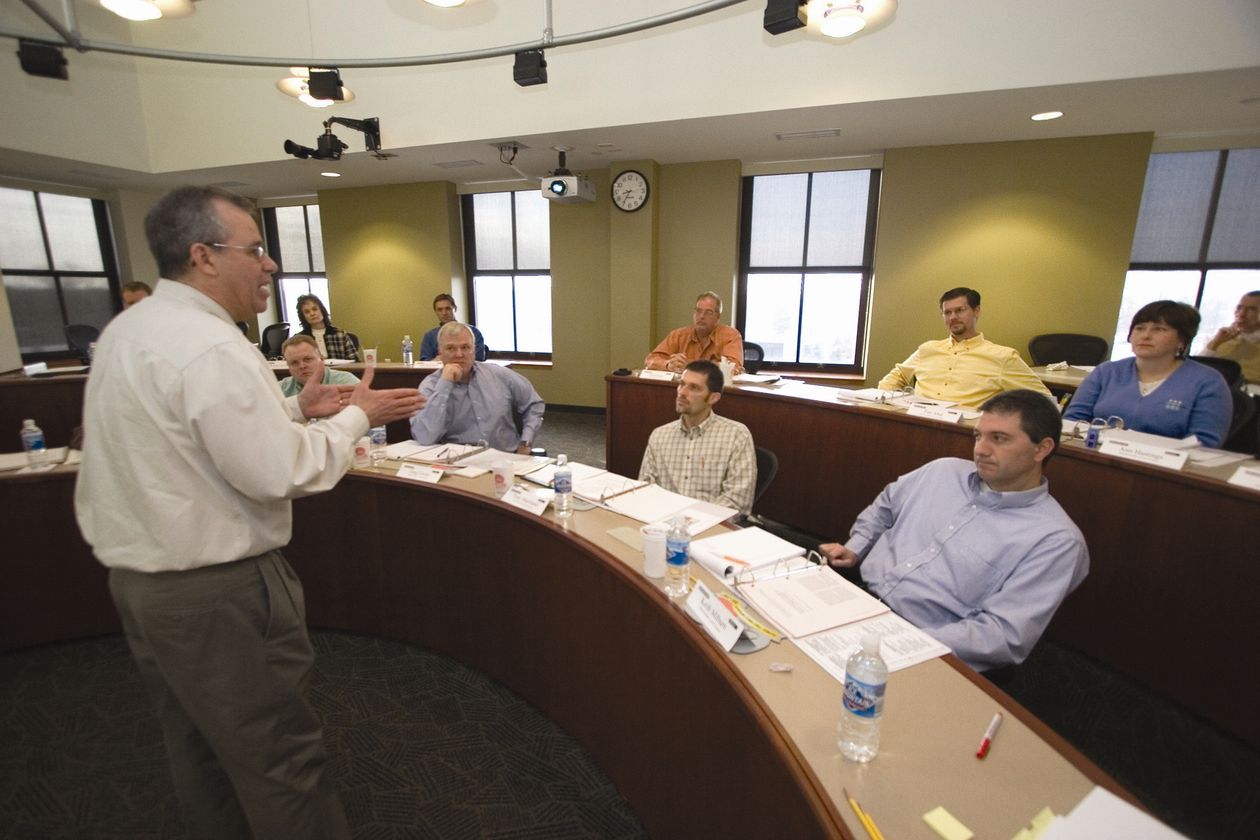The College of Business (COB) is ratcheting up efforts to provide advanced leadership development programs for executive teams and boards throughout the region.
According to Richard Ringer, director of the Organizational Leadership Institute (OLI), business faculty have long provided expertise to businesses and nonprofits in the Twin Cities community. But there’s renewed vigor behind a desire to put together assessment and training programs to affect real change among the area’s top executives.
Unlike off-the-shelf professional development or non-academic executive training, the OLI offers high-level coursework taught by faculty in the College’s nationally ranked MBA program. Custom-made services include on-site classes, assessment and other self-study measurements and even one-on-one coaching.
Bloomington-based GROWMARK first tapped the OLI in 2007 for leadership education and development classes as part of its executive-training program. Becky Ropp, director of talent management at GROWMARK, described it as an extensive series of seminars and workshops for groups of about 16 “high-potential” executives. Topics included new product development, marketing, project management, performance management and legal responsibilities.
ISU business faculty provided the academic foundations while GROWMARK executive vice presidents applied the theory to company practice and values.
“The professors did a really nice job of working with our vice presidents to pull out the learning points,” Ropp said.
In addition to learning course content, participants also collaborated with one another in general.
“At the time we had various silos in the organization and being together was a real benefit for the participants,” she said.
Even better, the vice presidents openly discussed the company’s successes and failures.
“We talked about the decisions we made in our history that didn’t go well and what we would do to avoid similar decisions today,” she said. “It was tremendously advantageous for future leaders to hear that humility in another leader. It turned out to be a very powerful training program.”
Peter Trotter is an ISU alum, MBA ’10, who was in a unique position when he was selected for the program at GROWMARK.
“Some of it was a refresher, a super-condensed version of what I learned in the corporate MBA program at ISU,” Trotter said.
Now associate general counsel at GROWMARK, Trotter feels that the training helped him tailor what he learned in graduate school to the GROWMARK environment. “It’s really good for any student to take a business concept and put it in practice.”
Nonprofits
The OLI also works with leaders of nonprofit organizations, such as the board of directors of the Illinois Soybean Association, a statewide organization based in Bloomington.
Linda Snell, a consultant for LBL Strategies in Chicago, asked Ringer to develop a training package for the Soybean Association board after learning of the OLI’s track record with GROWMARK.
“We believe in working with universities because of their credibility,” she said. “We were looking for an advanced program that would teach contemporary leadership techniques. The Association could have put together its own speaker series but it wanted more than the basics.”
Now in its second year, the project consists of day-and-a-half sessions to help farmer-leaders become more knowledgeable, Snell said.
“The purpose is to stretch the farmer-leaders, to help them lead as an officer, to go to national organizations or wherever they would like to take their leadership next,” she said.
Transformative self-assessment
The college and its long partnership with COUNTRY Financial took on new meaning in 2012 with one of the OLI’s most transformative leadership development efforts to date.
COUNTRY identified three core competencies for its leaders—engagement, empowerment and accountability—and asked the OLI to develop an assessment tool to measure the current baseline of performance on those competencies. A team of faculty that included Nathan Hartman, Mathew Sheep, Laura Erskine and Yongmei Liu created and administered an in-depth assessment to nearly 400 company leaders, including CEO Kurt Bock, and analyzed the results.
“We had never done anything like that before,” said Barbara Taft, director of human resources. “It was very insightful. Almost everyone in the company participated as a rater so it allowed us to see where we needed to improve. Reports were issued and action plans built around it.”
Next steps include exploring a comprehensive curriculum on leadership with the OLI.
“(It will be) based on what skills we are looking for in our leaders to help us move forward,” Taft said.
Two-way bridge
The OLI’s leadership development efforts clearly change organizations that are dedicated to studying—and improving—their leadership teams. But another cohort stands to benefit: COB students.
“Individual faculty are involved in several organizations, and our bridges to the community are stronger than ever before,” Ringer said. “We love going out, and we love having professionals come here to talk to our students, to visit classes, and offer their perspective. We view leadership-development programs as partnerships. The more chances we have to work with the professional community, the better we feel that we do in our role as faculty.”
In fact, after a year-and-a-half respite, the OLI is gearing up two of its long-standing leadership opportunities for students, the Leadership Fellows and Summer Reading programs. Both connect students with industry leaders who visit campus and share their insights in a smaller group setting than standard classroom visits.
“We have a superb faculty, great thinkers, and teachers who are published and who have significant work experience,” Ringer said. “They are excellent at working with professionals in leadership roles and have a great deal to offer in training and development.”
If history is any indication, their expertise will continue to be a boon to area leaders and ultimately transform the companies they lead.


